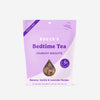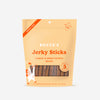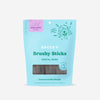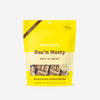
February isn’t just the month of love — unless you love brushing your dog’s teeth, that is. Officially recognized as Pet Dental Health Month, February is dedicated to raising awareness and spreading information about the importance of taking care of our pet’s teeth. But when there’s so much information out there about pet dental health, where do you even start? Don’t worry, we’ve got you covered.
Why Pet Dental Health is Important
Believe it or not, dental disease is one of the most common health issues that can affect our pets. In fact, periodontal disease alone affects 80-90% of dogs over the age of three. Animals with periodontal disease might experience chronic pain, difficulty eating, cracked or broken teeth, gum disease, and a whole slew of other mouth-related problems. On top of that, evidence suggests that poor oral hygiene can also lead to an increased risk for health issues like heart disease.
Because so much of your pet’s health starts in the mouth, it’s especially important to keep up with their oral hygiene and be able to recognize some of the more common misconceptions floating around about pet dental health.
Some Common Misconceptions about Dental Health
“Every animal has bad breath and it’s nothing to be worried about.”
While our pets having bad breath may seem like a normal part of life, persistent bad breath—also known as halitosis—is actually often an indicator that something is wrong. If you find yourself recoiling every time your dog or cat gets a little too close to your face, it might be time for a visit to the vet; especially because bad breath can often be a result of kidney or liver disease.
“In the wild, this isn’t a problem. Won’t eating just clean their teeth?”
One of the most common misconceptions about pet dental health is that your pet is getting adequate cleaning just by eating their dry food. While dry food can, technically, scrape your dog or cat’s teeth, it is by no means an effective dental care solution. Most animals don’t chew their food thoroughly enough for kibble to even make a difference in their overall dental health anyways.
In that same vein, you should never offer your pet bones as treats or as a way to brush their teeth. Because bones can splinter, they pose a risk to your pet’s health and can lead to choking or intestinal blockage. Because of this, it’s better to steer clear. If you’re looking for an alternative to bones, bully sticks might be a good fit for your dog — though they shouldn’t substitute regular dental care, either.
“Cat’s don't suffer from dental problems.”
Regular dental care is just as important to cats as it is to dogs. In fact, cats are just as likely—if not more likely—to suffer from periodontal disease. Many people shy away from providing their cats with adequate dental care because of their temperamental nature, but getting your cat adjusted to toothbrushing time is an important part of their overall wellness.
“I heard that anesthesia-free dental cleanings are just as safe and effective!”
While some salons or pet stores will offer anesthesia-free dental cleanings, the general consensus about these procedures is that they are not as safe or effective as a dental cleaning that your pet could get at the vet. In order to protect your pet while also providing them with the best possible care, we recommend that any dental procedures be done by your vet instead of a third party.
How can I keep my pet’s teeth clean?
While it might seem like a daunting task at first, it’s important to get your dog or cat used to the routine (and feel!) of toothbrushing time. Also remember to never give your pet toothpaste that’s intended for humans, as it isn’t safe for them.
You can also supplement toothbrushing time with dental chews, which are specifically formulated with the unique dental needs of dogs in mind. Our favorite dental chews are made by Ark Naturals, who pride themselves on offering a dental chew for every dog. Not only do dental chews help scrape plaque and tartar from the teeth, but they also provide your pet with a routine!



